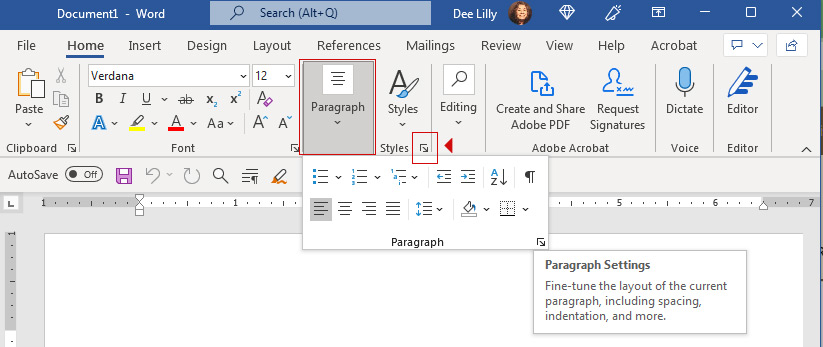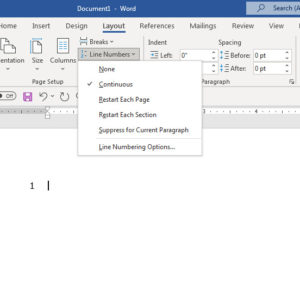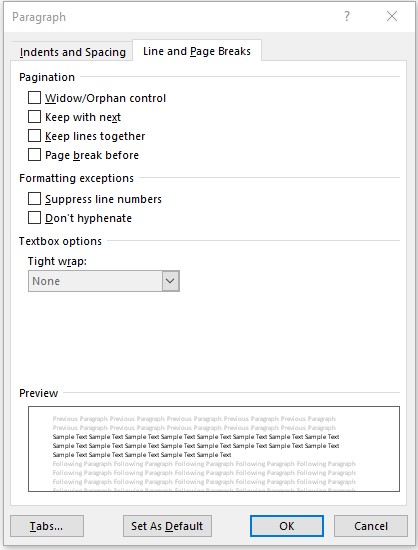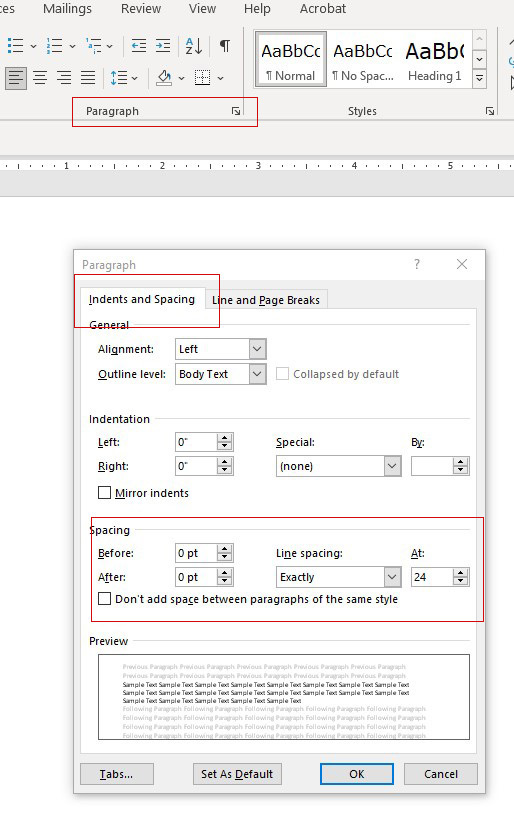RESOURCES - For writers of all genre, and the readers who love them. Find what you want to know.
Achieving 250 Words / 25 Lines Per Page
Formatting Manuscripts
By Deanna Lilly
These are generic formatting options to achieve the basics. Always check with the Editor/Publisher’s Tip Sheet for formatting options and the style they want.
General Typing
Remember do not put an extra line between paragraphs. Hit the return. Indent the first sentence 5 spaces (use the Tab key). If you manually add 5 spaces it makes it a nightmare for the publisher to convert you manuscript to their publishing format. You don’t’ want them angry at you for not knowing the basics.
Fonts and Margins
In order to achieve the ideal format for novel submission, your must strive for 250 words per page, with margins at one inch all around (some editors want a left margin of one and one-half inch) using either Courier 12pt or Times New Roman 14pt fonts. Several editors have told me that Courier 12pt is easier to read. And, the last thing we want to do is give an editor a headache from eyestrain as he/she reads our manuscript. I am sure some of the following “tricks” can benefit even the seasoned writer.
You sit down at your computer, set your margins and begin counting lines. The tips of your fingers smudge your nice clean screen with the oozing chocolate you’ve just eaten as a source of inspiration. Unbelieving, you go to another page and count again only to discover a variance of 23 to 28 lines per page depending on the word processing program you use (MSWord). Don’t panic–there’s an easy solution to achieving exactly 25 lines per page.
Line Spacing
SOLUTION – MSWord: Click on HOME menu. Select the small box in the lower right corner of the PARAGRAPH section.

Go to the center section of the dialog box that says SPACING.
Find the little box that says LINE SPACING and click on the down arrow.
Click on EXACTLY and in the little box to the right change the 12pt to 24pt (you can double click on the number or drag select it or simply delete the number part. If you remove part of the “pt”–remove all of it), then type in the number 24. When you press enter or click on OK the “pt” will return. (Note: this number could vary depending on your printer’s internal setups.)
UNCHECK Don’t add space between paragraphs of the same style.

For a quick and easy solution to the problem of counting lines, turn your line numbering on until you are ready to do the final print of the manuscript to send to the editor. (Turning off line numbering–you follow the same steps and remove the check mark, or deselect the option.)
Counting lines is especially helpful when using critique groups. Use the Continuous options so each line has a unique number for easier reference with the groups.
SOLUTION – MSWord: Click LAYOUT in the menu bar. Click on the small down arrow next to LINE NUMBERS. Choose Continuous.
Windows and Orphans
 There is one more trick you want to make sure and do to insure you get 25 lines per page. You MUST turn off the widows and orphans lines. Widows and Orphans cause the paragraph to automatically move at least two lines to the next page to prevent a single line ending a paragraph on a page. Editors are not concerned about the single line; they want the 25 lines per page regardless of an orphan line.
There is one more trick you want to make sure and do to insure you get 25 lines per page. You MUST turn off the widows and orphans lines. Widows and Orphans cause the paragraph to automatically move at least two lines to the next page to prevent a single line ending a paragraph on a page. Editors are not concerned about the single line; they want the 25 lines per page regardless of an orphan line.
SOLUTION – MSWord: Click HOME in the menu bar.
Click on the small bos in the rlower right corner of PARAGRAPH..
UNCHECK everything. The Widow and Orphan option is the top box, but you do not want any of the options active for this type of manuscript typing.
Now your lines will end up exactly at 25 lines per page and your word count will average 250. Some pages will have fewer words, some a few more but that is acceptable. Good luck and good writing.
* * * * * * * * * * * * *
Special Instructions for Harlequin/Silhouette submissions: The standard 1″ margin/250 wpp doesn’t work with the way H/S calculates words per page. To them, a page with one-inch margins all around averages up to 12 words per line, times 25 lines per page, is 300 wpp (no matter how much of the page is dialogue instead of narrative). If you are submitting to H/S, go with their word count formula and set both of your side margins to 1.25″ to get 10 words per line and thus, 250 wpp. — Contributed by Shrley Jump
AGENTS & EDITORS
- Agents: Knowing When To Hold One and When To Fold
- Getting Offers from Multiple Literary Agents
- Literary Agents List
- Preditors and Editors
- Publishing, Writing Terms, Acronyms
- Tips for a Successful Editor Appointment
- Want More? Here’s How to Get It
- What NOT to Do When Beginning Your Novel
- Windup for the (Story) Pitch
- Write the Perfect Book Proposal
CALLS FOR SUBMISSION
- 2025 FEB Calls for Submission
- 2025 JAN Calls for Submission
- 2024 DEC Calls for Submission
- 2024 NOV Calls for Submission
- 2024 OCT Calls for Submission
- 2024 SEP Calls for Submission
- 2024 AUG Calls for Submission
- 2024 JUL Calls for Submission
- 2024 JUN Calls for Submission
- 2024 MAY Calls for Submission
- 2024 APR Calls for Submission
- 2024 MAR Calls for Submission
- 2024 FEB Calls for Submission
COMPUTER TIPS
- ASCII Characters
- Building Your Web Site and Doing It Right
- Don’t Be a Victim-Scams, Identity Theft, Urban Legends
- Don’t Spread Scams
- How to Annoy Your Website Visitors
- Internet Safety: Guide to Keep Your Information Safe Online
- Knowing Your Target Audience
- Stopping Viruses from Propagating Through Your Email
- The Top 10 Email Errors
- Word Processors Through Time: Before MS Word & Google Docs
FORMATTING & GRAMMAR
- Achieving 250 Words / 25 Lines Per Page
- And Sammy, too? Oh, No!
- Changing Double Hyphens to EM Dashes in Word
- Edit Easier
- High Hopes–Avoiding Common Mistakes
- Misused Words
- Navigating In Your Novel
- Proofreaders Marks
- Research Links
- Rules for Writers
- Slang and Jargon Souces
- Tightening Your Manuscript and Trimming the Word Count
INSPIRATION-MOTIVATION
- A Dream Realized
- Beyond the Basics
- Dumb Little Writing Tricks That Work
- Finding Time to Write
- Five Ways to Promote Yourself
- How Not to Procrastinate
- How to Quit Writing and End up on the Bestseller Lists
- Ideas Escape Me
- Keeping an Idea Book
- Love to Write: Here Is How You Can Build Your Career
- Making Time for Self-Care While Running a Business
- Moving Up the Rejection Ladder
- Pop Quiz: Who Are You?
- Rules for Writers
- The 8 Habits of Highly Successful Young-Adult Fiction Authors
- The Art of Being Rejected–475 Words
- The Juggling Act
- The Literary Food Chain
- Various Types of Writing for Young Writers
- Why Article Writing Should Be A Part Of Your Career Development Strategy
- Write Better Naked
- Writer’s Conferences Do You Really Need To Attend?
- Writing By Moonlight
MARKETS
- 35 Online Work Ideas to Earn Good Money Whilst Studying
- Agents: Knowing When To Hold One and When To Fold
- An Interview with Holly Ambrose
- Copyright Primer, Know Your Rights
- EBooks-Fears to Possibilities
- Finding Markets Fiction and Nonfiction
- Freelance Writing 101
- Getting Offers from Multiple Literary Agents
- How To Be a (Shiver) Reporter
- How To Market Your Book After You’ve Written It
- How to Write a Novel Synopsis
- How To Write Your Own Press Releases
- Love to Write: Here Is How You Can Build Your Career
- Magazine Links
- Making Money As a Corporate Freelancer
- Market News–All Genres
- Need a Clip? Open a Newspaper
- Newspaper Writing Resources
- Path to Self-Publishing Success
- Publishing, Writing Terms, Acronyms
- Science Writing Organizations
- Selling to Children’s Markets
- Submission Tracking
- Submitting to UK Markets
- Syndication 101
- To Specialize, or Not to Specialize?
- Ultimate Guide to Being a Freelancer 2023 Update
- What Are Your Chances of Getting Published?
- Why Article Writing Should Be A Part Of Your Career Development Strategy
- Why E-Books?
- Write the Perfect Book Proposal
- Write Your Way to $1000 a Month
- Writing Groups List
- Youth Writing Markets
ONLINE SAFETY
PUBLISHING
- Agents: Knowing When To Hold One and When To Fold
- Copyright Primer, Know Your Rights
- Getting Offers from Multiple Literary Agents
- How To Market Your Book After You’ve Written It
- How to Write a Novel Synopsis
- Love to Write: Here Is How You Can Build Your Career
- Making Money As a Corporate Freelancer
- Path to Self-Publishing Success
- Publisher’s Websites
- Publishing, Writing Terms, Acronyms
- Science Writing Organizations
- Submission Tracking
- Syndication 101
- The Great Limbo Mystery Question
- What Are Your Chances of Getting Published?
- Why Article Writing Should Be A Part Of Your Career Development Strategy
- Why E-Books?
- Write the Perfect Book Proposal
VIDEO & STREAMING LINKS
WRITING TOOLS - APPS
- And Sammy, too? Oh, No!
- Beyond the Basics
- Changing Double Hyphens to EM Dashes in Word
- Dumb Little Writing Tricks That Work
- Finding Your Writing Compass: A Guide to Freelance Adventures
- Free AI Tools That Can Be Used In Business Writing
- Helpful Books
- High Hopes–Avoiding Common Mistakes
- Ideas Escape Me
- Knowing Your Target Audience
- Magazine Links
- Misused Words
- Newspaper Writing Resources
- Path to Self-Publishing Success
- Reconsider Hand Writing
- Research Links
- Slang and Jargon Souces
- The 8 Habits of Highly Successful Young-Adult Fiction Authors
- Unblocking Your Muze
- Various Types of Writing for Young Writers
- What NOT to Do When Beginning Your Novel
- Why Article Writing Should Be A Part Of Your Career Development Strategy
- Word Processors Through Time: Before MS Word & Google Docs
- Working with a Critique Group
- Writing Groups List
- You Can Write A Short Story Part 1 The Story Idea
- You Can Write A Short Story: Part 2 The Meat of the Story
- You Can Write A Short Story: Part 3 The Climax
WRITER'S LIFE
- A Dream Realized
- A Writers Dream-The Home Office
- Affirm All You Want
- Finding Time to Write
- Finding Your Writing Compass: A Guide to Freelance Adventures
- How To Be a (Shiver) Reporter
- How To Write Your Own Press Releases
- Keep a Clipping File
- Keeping an Idea Book
- Love to Write: Here Is How You Can Build Your Career
- Making Time for Self-Care While Running a Business
- Mommy’s Muse
- Moving Mountains
- Mud Pies
- Teach Yourself to Write
- The 8 Habits of Highly Successful Young-Adult Fiction Authors
- The Art of Procrastination
- Various Types of Writing for Young Writers
- Working with a Critique Group
- Writer’s Conferences Do You Really Need To Attend?
- Writing Conferences-Educating and Inspiring
WRITING CONTESTS
WRITING CONTESTS
.
• ALL WRITING CONTESTS
- 2025 FEB Writing Contests
- 2025 JAN Writing Contests
- 2024 DEC Writing Contests
- 2024 NOV Writing Contests
- 2024 OCT Writing Contests
- 2024 SEP Writing Contests
- 2024 AUG Writing Contests
- 2024 JUL Writing Contests
- 2024 JUN Writing Contests
- 2024 MAY Writing Contests
- 2024 APR Writing Contests
- 2024 MAR Writing Contests
ABOUT WRITING CONTESTS

